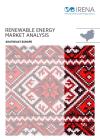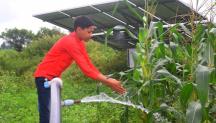

-
-
IRENA (2019), Renewable Energy Market Analysis: Southeast Europe. IRENA, Abu Dhabi.
Copied
/-/media/Files/IRENA/Agency/Publication/2019/Dec/IRENA_Market_Analysis_SEE_2019.pdf
Copied
Renewable Energy Market Analysis: Southeast Europe
Newsletter
Southeast Europe (SEE) has considerable potential to develop its economies and improve its energy efficiency by increasing and diversifying its mix of renewable energy technologies. To harness this potential and progressively phase out fossil fuels, the region needs updated renewable energy targets, sustained investment in solar and wind technologies, incentives to develop modern biomass, and a holistic policy framework to create new jobs and maximise socio-economic value.
This report from the International Renewable Energy Agency (IRENA) explores the prospects for renewables to enhance national economies and strengthen the SEE energy mix. It analyses the current energy landscape, the potential and costs for scaling up renewables, the policy frameworks and investments required, and the expected socio-economic impact of transforming the region’s energy system.
Falling costs for renewable-based technologies and the need to replace ageing existing energy infrastructure have opened the door for the shift to a sustainable, climate-safe energy system. Still, several financial barriers must be addressed to stimulate investment.
Among other findings:
- Dedicated targets, along with auctions, tariffs and other policy support measures, helped to increase annual investment in renewables in SEE to a peak of USD 3.7 billion in 2012.
- The coming decade (until 2030) could prove pivotal as costs for renewables continue falling and SEE governments undertake energy sector reforms.
- SEE governments need to adopt holistic policy frameworks to support renewables in end-use sectors including direct heat and transport.
- Modern bioenergy solutions provide a cost-competitive energy source in all end-use sectors.
- Scaling up renewables and improving energy efficiency would spur economic growth and create jobs.
- Appropriate targets and policies are needed to develop strong renewable energy supply chains and manage the socio-economic impact of the energy transition.
IRENA’s Renewable Energy Market Analysis series captures knowledge and experience from different regions and identifies emerging public policy and market development trends. Previous editions covered Southeast Asia, the GCC (Gulf Co-operation Council) and Latin America.
IRENA’s engagement in the SEE region began with a widely endorsed regional communiqué on accelerating the uptake of renewables.




